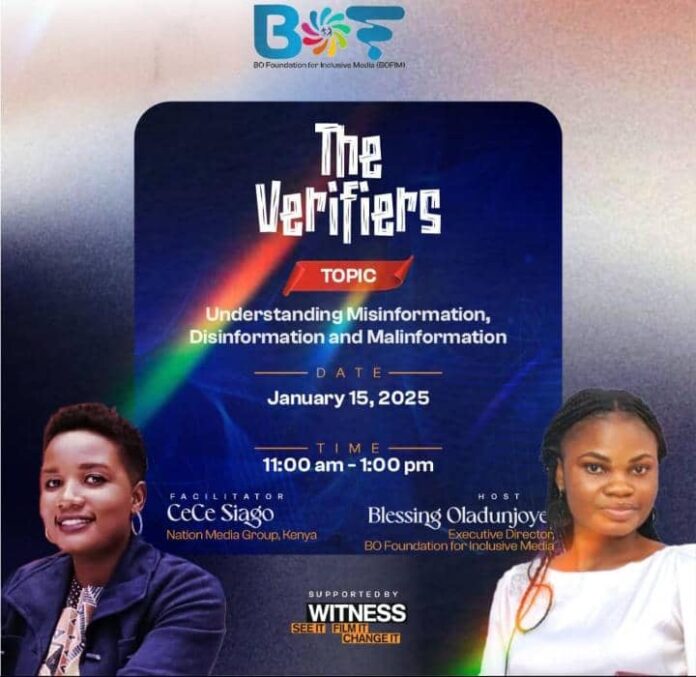As part of its ongoing commitment to promoting media integrity, BO Foundation for Inclusive Media (BOFIM) joined forces with WITNESS to deliver a training program focused on equipping emerging journalists with the skills to counter misinformation.
The training initiative brought together a promising group of early-career journalists and student journalists, who will spearhead ‘The Verifiers’ – a groundbreaking movement dedicated to promoting fact-based journalism and combating misinformation.
The founder of BOFIM and publisher of BONews Service, Blessing Oladunjoye, in her welcome address acknowledged the participants commitment to improving their skills in fact-checking and verification.
She emphasized that the selection process for participants was intentional. “We wanted to engage the right people for this initiative ,” she explained. “Some of you have introduced yourselves as interns or students, which is exactly what we were hoping for. This is a chance for you to gain essential skills in open-source investigative tools and fact-checking techniques.”
Oladunjoye explained that the main objective of the training was to empower participants with the tools needed to ensure the public consumes factual information, a pressing concern in the age of digital media. “A lot of journalists have been trained in various ways, but misinformation is still rampant,” Oladunjoye said. “We need to engage those who can really make a difference, especially those who will be producing stories that are gender-sensitive and disability-focused.”
Oladunjoye further explained the inclusion of disability rights advocates in the program, ensuring that the training addressed misinformation related to people with disabilities. “We want to ensure that persons with disabilities can also be part of the verification process,” she noted. “The goal is to create inclusive stories that will challenge the spread of misinformation targeting vulnerable groups.”
“The Verifiers” project, Oladunjoye explained, focuses on building verification experts across Southwest Nigeria. “We want you to become experts who can verify and publish factual information and counter the spread of misinformation,” she said. “This is especially important in an era where artificial intelligence is being used to create misleading content.”
Oladunjoye recalled a recent incident involving a fake AI-generated image of Pastor Enoch Adeboye, General Overseer of the Redeemed Christian Church of God, in Mecca, illustrating the challenges posed by new technology. “AI can be a tool for good, but it can also be misused to spread misinformation,” she pointed out.
She added that the training will cover such topics, helping participants understand how AI and digital tools can both assist and hinder verification efforts.
The facilitator of the training, CeCe Siago, a journalist and fact- checker with Nation Media Group in Kenya spoke on misinformation, disinformation, and malinformation.
Siago provided specialized knowledge in fact-checking and media ethics. She spoke on the role social media platforms like Twitter, TikTok, and WhatsApp play in spreading false information.
“These platforms bring a lot of information, and some of it is false.
“As journalists, it’s important to verify before sharing anything, especially when it comes to viral content,” Siago noted
Siago also discussed the different categories of information disorder: misinformation, disinformation, and malinformation. “These categories all have the same target: to mislead the public,” she explained. “Our role as journalists is to ensure we verify the information before sharing it with our audience.”
Adewusi Temitope, a key member of the project, discussed the training objectives with the participants. “One of our goals is to equip you with advanced open-source intelligence tools and fact-checking techniques,” Temitope said. “This will help you verify information and identify false narratives.”
She also highlighted the importance of building the capacity of journalists and human rights defenders to mitigate the spread of misinformation. “We want to address misinformation, especially in contexts affecting social inclusion and democratic stability,” Temitope added. “This project will help you tackle these issues head-on.”
As the program progresses, the organizers promised that participants will continue to receive expert training to help them combat misinformation and uphold journalistic integrity.








